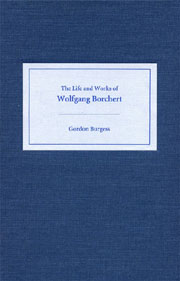Book contents
- Frontmatter
- Contents
- Acknowledgments
- List of Abbreviations
- Introduction
- 1 Childhood, School, Apprenticeship: 1921–1940
- 2 “The Happiest Time of My Life': January–June 1941
- 3 The Eastern Front and Courts-Martial: 1941–1943
- 4 Actor Turned Writer: Jena, Hamburg, and Basel: 1944–1947
- 5 The Poems
- 6 Draussen vor der Tür
- 7 The Short Stories
- 8 The Reception of Borchert's Life and Works
- Conclusion
- Published Works Cited
- Index
4 - Actor Turned Writer: Jena, Hamburg, and Basel: 1944–1947
Published online by Cambridge University Press: 05 February 2013
- Frontmatter
- Contents
- Acknowledgments
- List of Abbreviations
- Introduction
- 1 Childhood, School, Apprenticeship: 1921–1940
- 2 “The Happiest Time of My Life': January–June 1941
- 3 The Eastern Front and Courts-Martial: 1941–1943
- 4 Actor Turned Writer: Jena, Hamburg, and Basel: 1944–1947
- 5 The Poems
- 6 Draussen vor der Tür
- 7 The Short Stories
- 8 The Reception of Borchert's Life and Works
- Conclusion
- Published Works Cited
- Index
Summary
September 1944–May 1945: The Last Months in Jena
AFTER THE TURBULENT eleven months from December 1943 to September 1944, with all that he had experienced and feared, Borchert must have found life during the last phase of the war a haven of peace. After the verdict of the third court martial was confirmed on 4 September, he was transferred back to his battalion in Jena and found himself outside bars for the first time again on 15 September — and was immediately assigned to guard duty. Nevertheless, his newfound freedom made him feel quite light-headed, even though he at first expected to spend only a few days in Jena until the final formalities were completed, and was then expecting to be sent to the West. This freedom included being able to write and receive letters that were not going to have to pass through the censorship of the military court. At the end of September his mother visited him in Jena — Borchert called it “8 Tage lang Sonntag.” 2 On 4 October the army doctor authorized him for orthopedic boots, and in his letters he repeatedly refers to his lack of mobility: “In der Stadt war ich noch nicht wieder — […] und allein des Essens wegen gehe ich keine drei Schritte.” “Da ich fast gar nicht weggehe, will ich abends doch wenigstens immer etwas lesen.” It was a far cry from his previous time in Jena when he was out every evening, making the town “unsafe.”
- Type
- Chapter
- Information
- The Life and Works of Wolfgang Borchert , pp. 91 - 135Publisher: Boydell & BrewerPrint publication year: 2003

